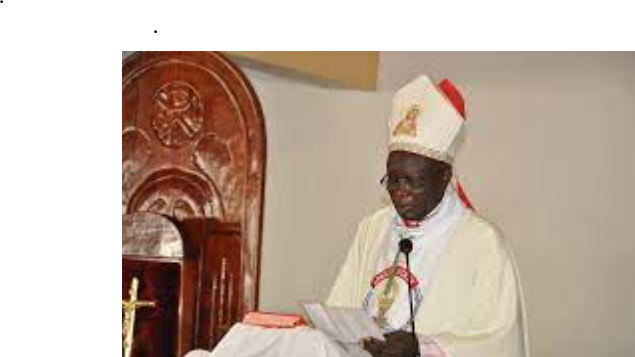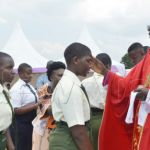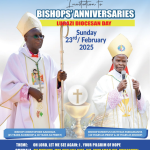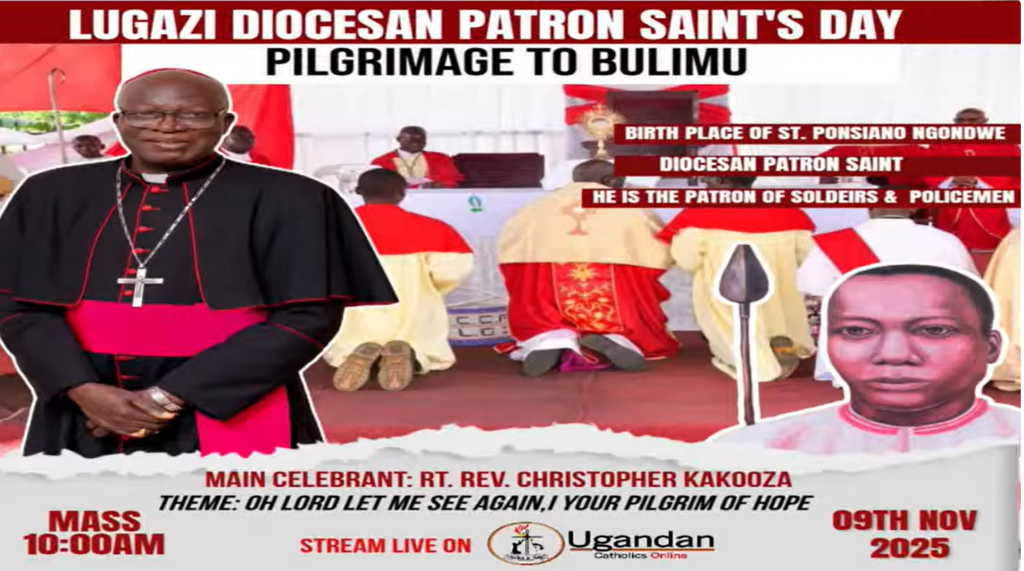Sometimes the hardest people group to pray for is family, because there may be a lot of history, years of unresolved issues, or perhaps despite your best efforts, it’s unclear how they will ever make the decision to surrender their lives to Jesus Christ as their Lord and Saviour.
On Sunday 23rd February, 2025 thousands of Christians flocked Mary Queen of Peace Lugazi Cathedral for a thanks giving celebration of the bishops’ anniversaries and the 28th Diocesan Day celebrations held under the theme, “Oh Lord, Let Me See Again; I, Your Pilgrim Of Hope.” On this magnificent occasion, the Ordinary of the Diocese Rt. Rev. Christopher Kakooza marked 25 years as Bishop and 40 years as priest, and Bishop Emeritus Matthias Ssekamanya marked 40 years and Bishop and 60 years as Priest.
The 28th Diocesan Day celebrations held under the theme, “Oh Lord, Let Me See Again; I, Your Pilgrim Of Hope.”
The Guests
The day was graced with the presence of four other bishops Bishops including the Bishop of Kiyinda Mityana Diocese and Chairperson of the Uganda Episcopal Conference Rt. Rev. Joseph Antony Zziwa, the Archbishop of Kampala, His Grace Paul Ssemogere, Former Pope Nuncio to Belgium, Emeritus Archbishop, Augustine Kasujja and Bishop of Kasana – Luweero Diocese, Lawrence Mukasa and a great number of priests. The Central Government was represented by the State Minister for Higher Education Hon. Dr. J.C Muyingo, and the Buganda Government was represented by Kyaggwe County Head (Ssekiboobo), Oweek. Vincent Matovu. Other government dignitaries who attended the occasion included State Minister for Finance and planning Hon. Amos Lugoloobi, Member of Parliament for Buikwe South Constituency Hon. Dr. Lulume Bayiga, Member of Parliament – Bamunaanika, Hon. Robert Ssekitooleko, Hon. Robert Migadde, Member of Parliament- Buvuma Islands, Member of Parliament Mukono Municipality, Hon. Betty Nambooze Bakireke, Member of Parliament Lugazi Municipality, Hon. Steven Sserubula and others
Jubilee Prayer 2025
Father in heaven, may the faith you have given us in your son, Jesus Christ, our brother, and the flame of charity enkindled in our hearts by the Holy Spirit, reawaken in us the blessed hope for the coming of your Kingdom.
May your grace transform us into tireless cultivators of the seeds of the Gospel.
May those seeds transform from within both humanity and the whole cosmos in the sure expectation of a new heaven and a new earth, when, with the powers of Evil vanquished, your glory will shine eternally.
May the grace of the Jubilee reawaken in us, Pilgrims of Hope, a yearning for the treasures of heaven. May that same grace spread the joy and peace of our Redeemer throughout the earth.
To you our God, eternally blessed, be glory and praise for ever.
Amen
The main celebrant and preacher was Bishop Christopher Kakooza
The main celebrant and preacher was Bishop Christopher Kakooza who in his homily thanked God for the gift of life and for enabling them reach this far. He congratulated Bishop Emeritus Matthias Ssekamanya upon his 60th Priestly and 40th Episcopal anniversaries and applauded him for his invaluable services in the growth and development of Lugazi Diocese.

He thanked the Clergy, Religious, Catechists, lay leaders and all the faithful for responding to the call to evangelise and win many for Christ- the Good Shepherd. He called upon the Christians to trust in God and be hopeful Pilgrims amid Challenges as instructed by Pope Francis in his Papal Document for the Jubilee Year 2025. He blessed seven newlywed couples including teachers and Christians from Kibubbu Sub-Parish where his residence is located.
The Theme of the Year
The theme for the 2025 celebration is drawn from the diocesan vision: “Oh Lord, Let Me See Again” (Mark 10:51). This theme is a call for the faithful to open their spiritual eyes, deepen their faith, and renew their commitment to Christ. Just as Bartimaeus, the blind man, called upon Jesus for healing, the faithful are encouraged to seek spiritual renewal, wisdom, and clarity in their journey of faith. The celebration will serve as a reminder to see the world through the lens of faith, recognizing the presence of Christ in everyday life, in service to others, and in the mission of the Church.
Its is the Jubilee 2025
“Jubilee” is the name given to a particular year; the name comes from the instrument used to mark its launch. In this case, the instrument in question is the yobel, the ram’s horn, used to proclaim the Day of Atonement (Yom Kippur). This (Jewish) holiday occurs every year, but it takes on special significance when it marks the beginning of a Jubilee year. We can find an early indication of it in the Bible: a Jubilee year was to be marked every 50 years, since this would be an “extra” year, one which would happen every seven weeks of seven years, i.e., every 49 years (cf. Leviticus 25:8-13). Even though it wasn’t easy to organise, it was intended to be marked as a time to re-establish a proper relationship with God, with one another, and with all of creation, and involved the forgiveness of debts, the return of misappropriated land, and a fallow period for the fields.
Quoting the prophet Isaiah, the Gospel of Luke describes Jesus’ mission in this way: “The Spirit of the Lord is upon me, because he has anointed me to bring good news to the poor. He has sent me to proclaim liberty to captives and recovery of sight to the blind, to let the oppressed go free, and to proclaim a year acceptable to the Lord,” (Luke 4:18-19; cf. Isaiah 61:1-2). Jesus lives out these words in his daily life, in his encounters with others and in his relationships, all of which bring about liberation and conversion.
In 1300, Pope Boniface VIII called the first Jubilee, also known as a
“Holy Year,” since it is a time in which God’s holiness transforms us. The frequency of Holy Years has changed over time: at first, they were celebrated every 100 years; later, in 1343 Pope Clement VI reduced the gap between Jubilees to every 50 years, and in 1470 Pope Paul II made it every 25 years. There have also been “extraordinary” Holy Years: for example, in 1933 Pope Pius XI chose to commemorate the 1900th anniversary of the Redemption, and in 2015 Pope Francis proclaimed the Year of Mercy as an extraordinary jubilee. The way in which Jubilee Years are marked has also changed through the centuries: originally the Holy Year consisted of a pilgrimage to the Roman Basilicas of St. Peter and St. Paul, later other signs were added, such as the Holy Door. By participating in the Holy Year, one is granted a plenary indulgence.
With the Bull Misericordiae Vultus of 11 April 2015,
With the Bull Misericordiae Vultus of 11 April 2015, Pope Francis declared a Jubilee for the 50th anniversary of the end of the Second Vatican Council. The Jubilee was dedicated to mercy. Before the official opening, as a sign of the Church’s closeness to the civil war-stricken Central African Republic, Pope Francis opened the holy door of the Cathedral of Notre-Dame in Bangui on 29 November, during his apostolic trip to Africa, anticipating the start of the Extraordinary Jubilee. The holy door of St Peter’s Basilica was opened on 8 December 2015, the feast of the Immaculate Conception. For the first time a ‘door of mercy’ was opened in the world’s cathedrals, sanctuaries, hospitals and prisons. For the occasion, the Pope established a group of priests known as Missionaries of Mercy to whom he entrusted the power to forgive sins usually reserved to the Holy Father.
In his speech, The Chairman of the Uganda Episcopal Conference, Bishop J. Antony Zziwa thanked Lugazi Diocese for the wonderful preparations. He appreciated the jubilarians for their selfless service in the Uganda Episcopal Conference and in Lugazi Diocese, and congratulated them upon this milestone achievement. He emphasised the Catholic Church’s Stance on Marriage stressing that “ marriage is a union between man and woman”, and does not recognise same sex – marriage calling upon Christians to protect the institution of Marriage.
Bishop Ssekamanya thanked God for protecting his life and the Christians for praying for his recovery. He urged them to promote vocations and fight for the truth.
Hon. Dr. J.C Muyingo who represented the Central Government congratulated the jubilarians and commended the Catholic Church for promoting growth and development through the integral human formation programmes.
Kyaggwe County Head (Ssekiboobo), Oweek. Vincent Matovu applauded Lugazi Diocese for promoting evangelisation and cooperating with Kyaggwe County in establishing and promoting development programmes to uplift the living standards of the people. He called upon the faithful to fully support Buganda Government programmes the same way they support the pastoral activities.
Several Diocesan founded schools including Stella Maris Girls Boarding Primary School, St. Joseph’s S.S.S Naggalama, Namilyango Junior Boys School and St. Theresa Girls Boarding Primary School Namilyango entertained the guests and thereafter, the Jubilarians received gifts, cut the cake, planted the memorial trees and served their guests with a wonderful luncheon.





